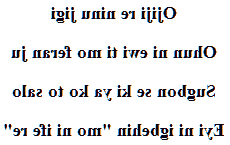Yoruba love poem
Jígí
Ojiji re ninu jigi
Ohun ni ewi ti mo feran ju
Sugbon se ki ya ko to salo
Eyi ni igbehin "mo ni ife re"


→ French poem ←
Yoruba language
Poetry in a language of Nigeria, mirror of Africa. Yoruba love poem (Ewi ti ife), for a lovely face with piercing eyes waving its long hair.
Yoruba (Yorùbá, Akono, Yagba, Yariba, Yooba, Ào, Bunu, Ede-Yoruba, Egba, Ekiti, Gbedde, Yorouba, Igbonna, Ijebu, Ijesha, Ikale, Ila, Ilaje, Iworro, Jumu, Ondo, Owe, Oyo, Awori, Aworo, Bini, Wo), is a Nigerian-Congolese language of the Kwa group, it's an official language in Nigeria.
Yoruba with the stress on the first syllable, is one of the major languages of Nigeria, and spoken by 35 million people; it is also spoken in Benin, Togo, and also in Cuba.
It is considered by some people, to belong the Kwa branch, and by some others, to belong to the Benue-Congo branch. It was the language of the great Oyo empire of Nigeria, which at its zenith in 18th century included much of present-day Benin.
The Yoruba alphabet, was largely the creation of Samuel Crowther, a freed Yoruba slave, who later became a Christian missionary. The Yoruba writing system, uses the Roman alphabet, augmented by letters with diacritics. The earliest written records include the vocabularies compiled by Thomas Bowdich in 1819, by Hannah Kilham, and by Wilhelm Koelle.
John Raban, Samuel Crowther will also contribute to the written record. Then it will be Crowther and king with the translation of the Old and the New Testaments. And then, the first vernacular periodical, a newspaper will be printed.
The Yorubas
The Yorubas are a people of south-west Nigeria, also settled in Togo and Benin. They live from agriculture and craft trade (renowned wood carvings); The distribution and the individual possession of the land, subject to the authority of a chieftain of lineage, had an obligatory socio-economic character.
Extended families, made up of related families on a patrilineal line, formed the basic social unit. The Yorubas constituted a population of a high culural level, even if they kept a long time many of their traditional beliefs (pantheon of deities, creative god).
Grouped into highly structured village states, they created kingdoms such as Ife, Oyo, Nupe, Ijebu and Benin, which were based on an important military force. Power was held by a king.
Among the Yorubas, poets and historians, men or women who perpetuate the soul of the people, are holders of the speech, which is both a force and a sacred act, they are both depositaries and transmitters.
Nigeria is the most populous African country and despite a large oil manna, remains relatively poor. The other national languages of this country are Hausa and Igbo.